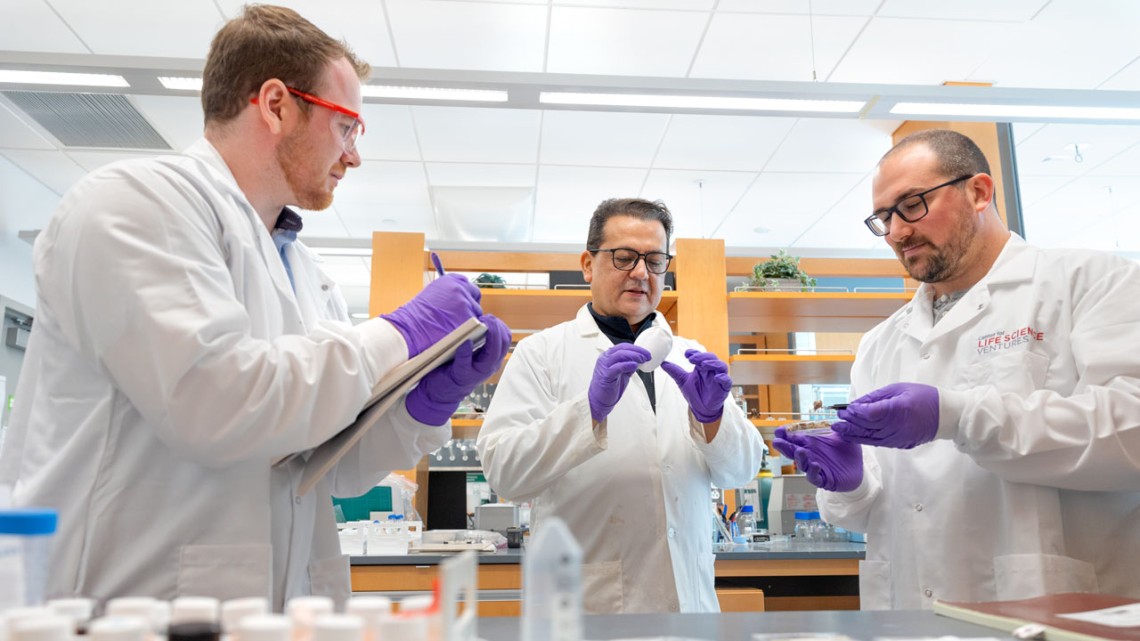By Bridget Hagen, Cornell Research & Innovation
Cornell’s incubator Class of 2025, composed of startups Llume, Meiogenix and TETmedical, is advancing innovations in human performance monitoring, non-GMO plant breeding and neurological critical care.
 From left, Melanie Lyons, M.Eng ’22, biomedical engineer at Llume; Roy Cohen, co-founder of TETmedical; and Ricardo Garcia de Alba, CEO of Meiogenix, show the certificates and mugs they received at the April 15 incubator graduation ceremony at Weill Hall.
From left, Melanie Lyons, M.Eng ’22, biomedical engineer at Llume; Roy Cohen, co-founder of TETmedical; and Ricardo Garcia de Alba, CEO of Meiogenix, show the certificates and mugs they received at the April 15 incubator graduation ceremony at Weill Hall.
“These three startups reflect the breadth and impact of innovations that stem from Cornell research – and they also highlight the international attraction exerted by Cornell’s business incubators,” said Lou Walcer ’74, director of the Center for Life Science Ventures (CLSV), at a graduation ceremony held April 15 in Weill Hall to honor the startups.
At the afternoon event, Walcer and Bob Scharf, director of the Praxis Center for Venture Development, recounted each graduate company’s challenges and recognized their growth as they presented them with graduation certificates and alumni gear.
Together, the graduating startups have raised $34 million in capital investment and created 33 high-tech jobs, including 16 in New York state.
“This process can result in quite significant economic contributions and technical contributions, and I’ve had nothing but excitement and real thrills in participating,” Scharf said.
Kurt Deriziotis, MBA ’21, business outreach director of Cornell’s Center for Advanced Technology, introduced keynote speaker Gary Koretzky ’78, the interim vice provost for research.
Koretzky said the incubators and their members represent Cornell’s core values of collaboration and interaction.
“It’s students, it’s faculty, it’s staff, it’s advisory boards, it’s donors, it’s folks who are really committed to making discovery go to the next level, and in the case of incubators, to take that discovery so it actually becomes meaningful for individuals,” he said. “Whether that’s in life sciences or whether it’s in the physical sciences, we’re here to celebrate our three successes.”
The graduating companies are:
- Llume, co-founded by Ilayda Samilgil ’19 and Rob Shepherd, professor of mechanical and aerospace engineering in Cornell Engineering, joined Praxis in 2020. The company’s patented fiberoptic sensor technology precisely monitors human fatigue, recovery and performance.
- Meiogenix, an agriculture biotechnology company founded by French researchers at Institut Curie in Paris, is developing improved plant crops based on chromosome editing. The company entered CLSV in 2022. The Meiogenix executive team includes CEO Ricardo Garcia de Alba, CTO Gaganpreet Sidhu, Ph.D. ’11; Wojtek Pawlowski, associate professor of plant breeding and genetics in the School of Integrative Plant Science, Plant Biology Section, at the College of Agriculture and Life Sciences, serves as a scientific advisor to the company.
- TETmedical, a member of CLSV since 2023, spun out of research on tethered enzyme technology conducted by two researchers at the College of Veterinary Medicine: Alex Travis, professor of reproductive biology in the Department of Biomedical Sciences, and Roy Cohen, research assistant professor at the Baker Institute for Animal Health. The company’s lead product is a novel confirmatory test for patients with suspected stroke. Entrepreneur and emeritus university trustee David Fischell ’75, M.S.E. ’78, Ph.D. ’80, leads TETmedical and serves as the company’s executive chairman.
The incubators admitted each graduating company for the sound scientific basis of their innovations, their demonstrated potential for commercial success and their likely societal benefit.
While incubating at CLSV or the Praxis Center, startups have access to state-of-the-art equipment and facilities. Members work intensively with mentors to develop their technologies and products; research potential markets; find strategic partners, distributors and customers; and secure grant and investment funding.
Companies graduate from the incubators once they complete their incubation plans and can operate sustainably off campus.
“CLSV has been our home for quite some time, and we’re sad to let it go. But we’re excited about what comes next,” said Garcia de Alba of Meiogenix. “Looking ahead, we’re preparing to make sure that we can attract investment while we continue unlocking the natural diversity of plants for generations to come, to be able to have access to healthy, natural, nutritious and tasty food.”














